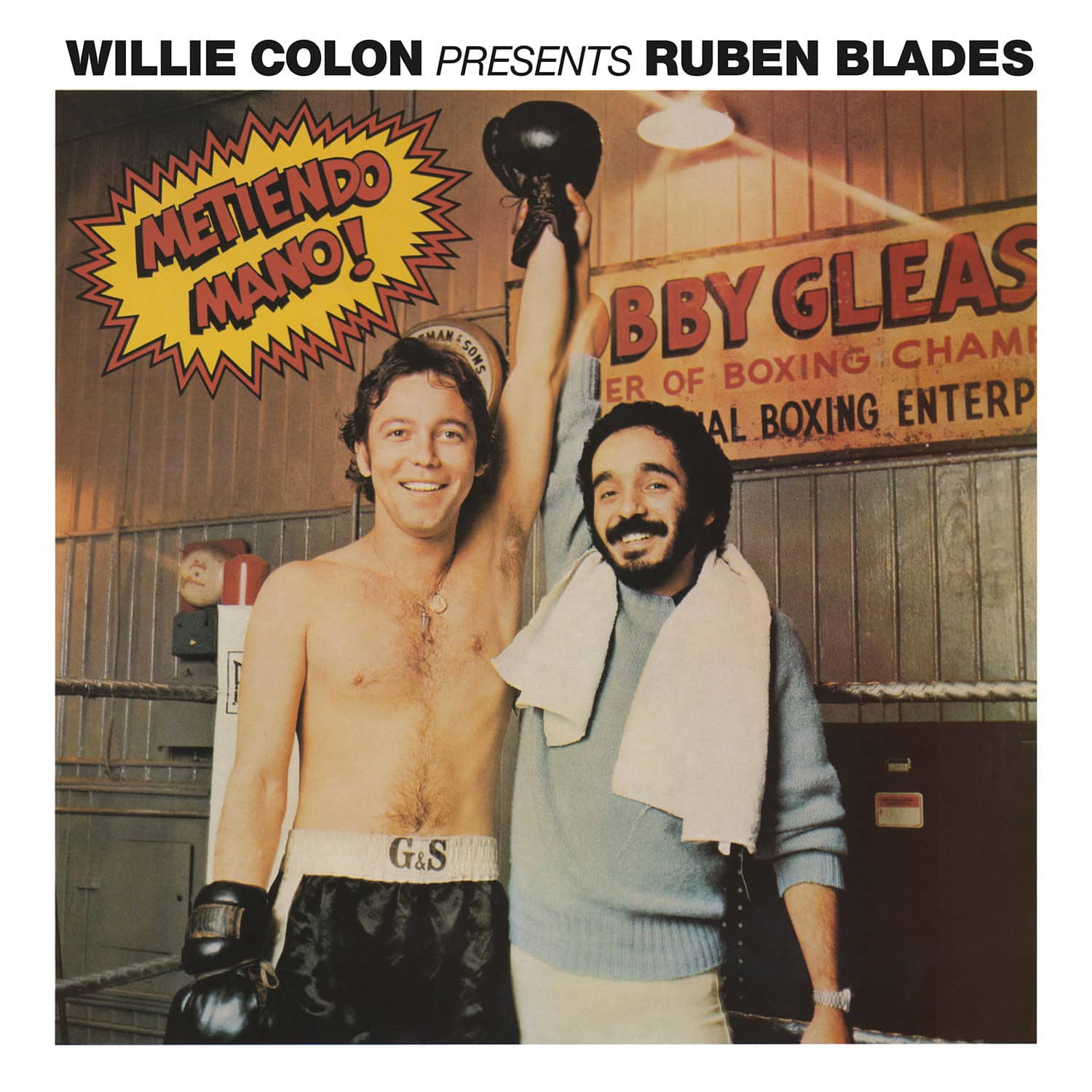Before Siembra became the best-selling salsa album of all time—before Rubén Blades became a household name—there was Metiendo mano!.
Craft Latino is proud to reissue this landmark 1977 debut from the groundbreaking duo of Willie Colón and Rubén Blades. Long out of print in the U.S., Metiendo mano! returns to its original LP format on July 11, featuring all-analog mastering and pressed on 180-gram vinyl. A limited-edition “KO Red” pressing (only 300 copies!) is available exclusively via Craft Recordings’ official Fania collection.
Metiendo mano! roughly translates to “getting involved” or “getting your hands dirty”—a fitting title for a record that boldly tackled the social and political realities of its time.
THE ROOTS OF CONSCIOUS SALSA
When Metiendo mano! hit shelves in 1977, it redefined what salsa could be. Willie Colón, already a superstar through his work with Héctor Lavoe, had just begun a new chapter.
Born and raised in the South Bronx, Colón signed to Fania Records at just 15 years old. His early records—including El malo and Cosa nuestra—fused Nuyorican street swagger with Afro-Caribbean rhythms and raw trombone-heavy arrangements. Across the ’60s and early ’70s, Colón helped define the sound of salsa and elevate it to the mainstream, particularly through his eleven-album run with Lavoe. By the mid-’70s, Colón had taken on roles as a producer, arranger, and musical director—and was seeking a new voice for his orchestra.
Enter Rubén Blades, a Panamanian singer-songwriter and budding political thinker who was working in the mailroom at Fania Records.
Blades came to music early, performing with popular Panamanian groups while studying law and political science. In 1970, he released his U.S. debut (De Panamá a New York) with Pete Rodriguez and soon moved to New York City. Though his first gigs in the U.S. music scene were behind the scenes, his collaborations with Fania artists—including Ray Barretto, Larry Harlow, and Colón himself—quickly revealed a distinctive songwriting voice. Blades’ lyrical style, steeped in narrative and social commentary, made him an ideal partner for Colón’s bold vision.
Together, they channeled sharp socio-political insight into timeless grooves. Tracks composed by Blades like “La maleta” and “Fue varón,” alongside powerful works by Felix Hernández, Johnny Ortiz, and Tite Curet Alonso, showed the depth and range of their combined voices.
A BOLD NEW VOICE
Blades brought a fresh lyrical sensibility to Colón’s orchestra—one grounded in empathy, intellect, and vivid storytelling. As journalist Jaime Torres-Torres notes,
“Anchoring his musical identity on salsa narratives, he revealed to the world the vicissitudes, dreams, thoughts, and struggles of people in Latin American cities.”
Colón gave Blades the space to explore this voice fully. The arrangements—crafted by Colón, Luis Ortíz, and Louie Ramírez—were brought to life by a powerhouse ensemble including Yomo Toro, Sonny Bravo, Milton Cardona, and a roaring brass section. Metiendo mano! was not just a creative breakthrough; it was a blueprint for a more reflective, message-driven kind of salsa.
LISTENING NOTES
- “Pablo Pueblo” - A landmark in Latin songwriting and the emotional centerpiece of Metiendo mano!. Blades’ portrayal of a working-class man struggling against the odds marked one of salsa’s earliest and most powerful dives into social realism.
- “Según el color” - Felix Hernández’s classic takes on new life here, as Colón’s vibrant arrangement underscores the song’s philosophical take on perception and inequality.
- “Plantación adentro” - A fierce, haunting indictment of colonialism and forced labor, penned by Tite Curet Alonso. One of the record’s boldest statements, driven by thunderous brass and raw urgency.
- “La maleta” - Blades’ storytelling shines in this character sketch of a man leaving everything behind. Hints of bolero meet brassy salsa swing—equal parts melancholy and momentum.
- “Lluvia de tu cielo” - A farmer pleads for rain in this aching ballad, brought to life by a subtle, folkloric arrangement. It’s a quiet standout that showcases the duo’s emotional range.
A SPARK THAT SET THE STAGE
Though the album wasn’t the commercial juggernaut that Siembra would become, its influence was just as profound. As journalist Jaime Torres-Torres writes,
“Metiendo mano! saw Colón and Blades singing to the exploited factory worker, whose income is not enough to provide for his wife and children; to the crossroads of the Hispanic migrants in the Big Apple; to the brutal genocide of the indigenous people; and the sociological realities of the barrio.”
It introduced a more reflective, message-driven approach to salsa—and it hit with power.
The project lit the fuse for a golden run of collaborations between Colón and Blades, including the GRAMMY®-nominated Canciones del solar de los aburridos and the record-breaking Siembra. It also marked the beginning of Blades’ rise to cultural icon: a socially conscious songwriter, activist, and EMMY®-nominated actor who continues to release music and perform worldwide.
Colón, meanwhile, has sold over 30 million albums and remains one of salsa’s most influential architects. In addition to his iconic work with Blades and Lavoe, he’s collaborated with Celia Cruz, Ismael Miranda, Soledad Bravo, and even David Byrne—while also remaining an outspoken advocate for social justice in New York.
